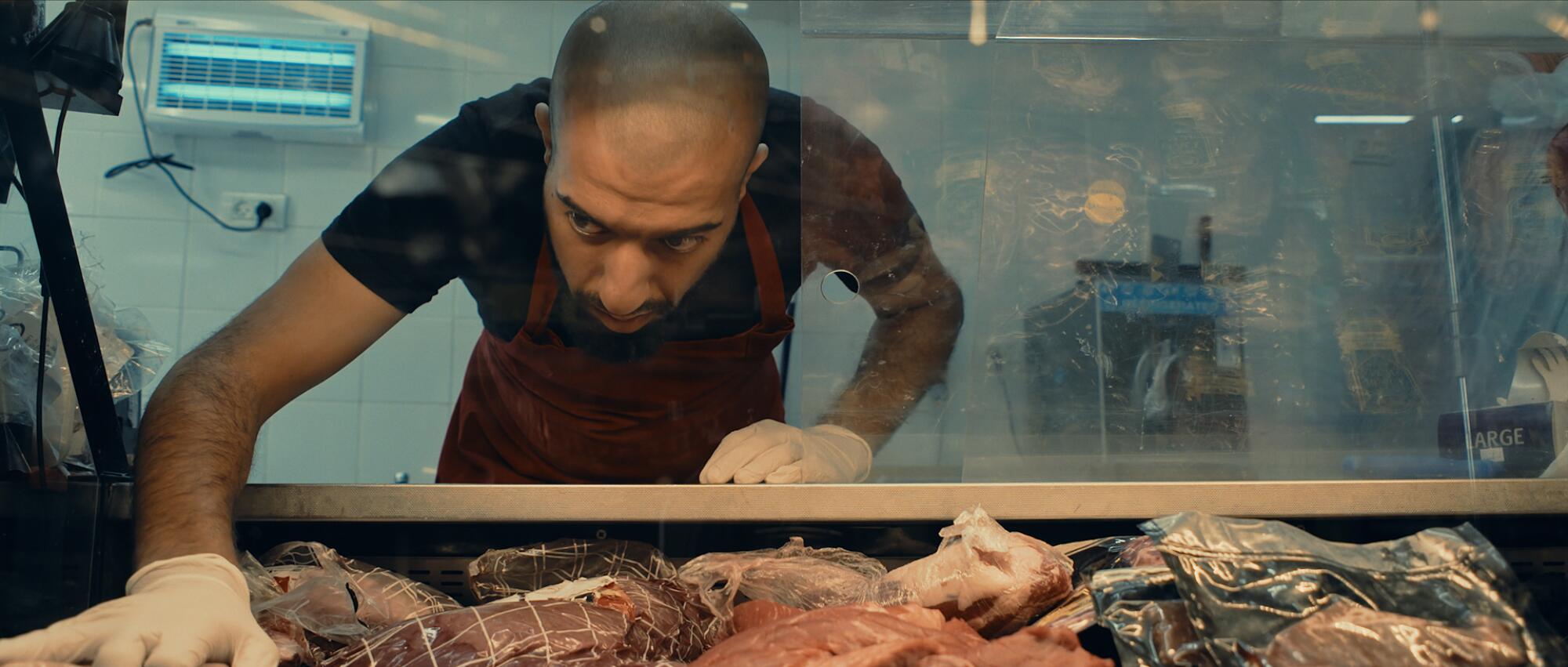Oscars 2026: Your guide to the 5 nominated live-action shorts
This year’s lineup of Oscar-nominated live-action shorts is as diverse as any in recent memory. From gritty political reality to absurdly cutting political commentary, tongue-in-cheek parody to touching, intimate drama (plus a moody adaptation of a Russian short story), voters have a wide selection from which to choose.
‘Butcher’s Stain’

Following the horrific attacks of Oct. 7, 2023, a Palestinian butcher in an Israeli shop finds himself accused of defiling a tribute to the hostages.
“I worked at the supermarket, and I experienced the collective trauma everyone was going through,” says writer-director Meyer Levinson, but he also felt how much animus “was pointed to the Palestinians that were working at the supermarket … individuals who have nothing to do with anything that happened, especially like my [movie’s] character, who is an everyday, working-class guy, trying to get money for his family, and has nothing to do with politics.”
Levinson calls making the film, his first, “one of the greatest experiences of my life. The set of a student film is a magical place; people come there for free, for passion. You just have to get them a decent sandwich.
“There were Palestinians, Jewish Israelis, Palestinians within Israel on set. It was this sort of paradise where we could come together. I’ve learned so much from my Palestinian actors, who’ve taught me about their community.”
‘A Friend of Dorothy’

(Filthy Gorgeous Productions)
In Lee Knight’s film, a chance meeting between a young Black Englishman in the process of finding himself and an elderly, white Englishwoman blossoms into an unexpected kinship — one based on Knight’s experience.
“I had a unique friendship with an elderly neighbor,” says Knight. “Me and my husband looked after her. She had this huge passion for the arts that she didn’t get to explore; when she realized we were actors, it was a huge thing for her. We became very, very close.
“She told me she would hide gay men in the garden during the war” and help them during the time of England’s infamous Section 28 (“banning the ‘promotion’ of homosexuality,” Knight says). He says it was meaningful for her “to see an interracial, gay couple happy and safe in her lifetime. As a gay man, I loved being around women because they didn’t judge me.”
‘Jane Austen’s Period Drama’

A charming country hillside. A fetching lass in Regency garb and her paramour, confessing his ardor. And the equivalent of a needle scratch as he’s halted by the appearance of blood on her skirt. Yes, that’s what’s meant by “Period Drama.” How will Miss Estrogenia Talbot elucidate this conundrum to Mr. Dickley? And once comprehending, shall he go with the flow?
Co-writer and co-director Julia Aks (who plays Estrogenia) admits it was the titular pun that got her and co-writer and co-director Steve Pinder going, but, “As we followed the thread, it made me reflect on shame I maybe hadn’t thought about. And the more I talked to women about funny period stories, I found they had heartbreaking ones.”
The film addresses stigma surrounding menstruation and includes biologically accurate descriptions; educational groups have screened it. But foremost, this “Period Drama” is a comedy.
Pinder says, “When you hear people laugh and come to life watching it, and then come up to you afterward and look like they’re floating … that is just incredible.”
‘The Singers’

Sam A. Davis didn’t exactly love Ivan Turgenev’s short story “The Singers,” at first — “honestly, I nodded off a couple times,” he says. “But it sneaks up on you. These guys have this fleeting moment of connection.”
The film updates Turgenev’s 1850s Russia to contemporary America, but maintains the “Lower Depths” social stratum. The low-down dive bar is draped in painterly shadows inspired by Renaissance masters, the stale cigarette stench palpable. Then the notion of a singing contest arises, and life stirs.
Davis says, after reading the story, “This sort of kismet moment happened where I opened Instagram and the first video that popped up was Mike Yung singing in the subway station in New York City. I flashed on a modern adaptation, but starring viral singing sensations.”
He recruited them to play themselves without a formal script. “It was almost like casting and writing were one process … I wanted it to be a love letter to the underdog. You never know who you’re sitting next to at the bar.”
‘Two People Exchanging Saliva’

(Misia Films & Preromanbritain)
In bold black and white, we find ourselves in a luxurious French department store. In this world, items are paid for by receiving slaps to the face. And the crime of kissing is punishable by death, raising the stakes as a young sales assistant bonds with a regular customer.
“We were writing in late 2022 and there was the reintroduction of the ‘Don’t Say Gay’ law in Florida,” says co-writer and co-director Natalie Musteata. “In a sense, it presaged the moment that we’re living through; we’re all living in the fever dream of Florida. But other things were influencing us — the policing of queer love through history; you open your phone and see these women [in Iran] being shot at for taking off their hijabs.”
Co-writer and co-director Alexandre Singh says Oscar winner Barry Jenkins told them, on selecting the film for a program he curated at the Telluride Film Festival, “ ‘When I first watched this in 2024, it was surrealist, satirical, almost farcical. I couldn’t imagine how much more relevant it could become, in a scary way.’ ”
